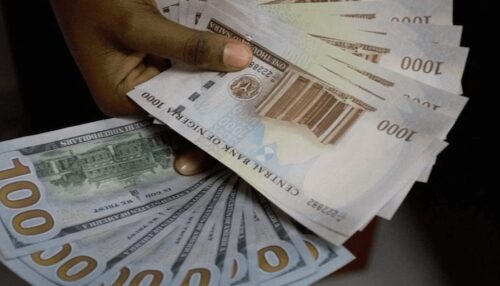The stability of the naira is currently facing significant challenges due to rising fiscal deficits, an increasing debt load, and persistently high inflation, which together could hinder the progress made by recent foreign exchange (FX) reforms.
These concerns were brought to light on Tuesday by Ugodre Obi-Chukwu, the founder and CEO of Nairametrics, during the 2025 economic outlook event organized by the Finance Correspondents Association of Nigeria (FICAN).
According to Obi-Chukwu, “Nigeria’s fiscal deficits, swelling debt profile, and high inflation remain major threats to the exchange rate’s stability and could negate the positive impact of ongoing FX reforms.”
He stressed that achieving a balanced exchange rate would require a consistent and sufficient supply of foreign exchange, taking into account the strengthening of the U.S. dollar and heightened competition for dollar inflows in emerging markets. Obi-Chukwu suggested that businesses should prepare for a worst-case scenario where the naira could depreciate to N2,200 per dollar while remaining optimistic about a potential improvement to N1,700 per dollar.
Exploring the challenges facing the naira, he noted that demand for foreign exchange has yet to fully recover, as many Nigerians continue adjusting to the effects of recent currency devaluations. He further emphasized that the persistent fiscal deficit is a key factor driving exchange rate depreciation, which is expected to persist in the short term.
Another critical concern is the high cost of borrowing, which poses risks as the country faces looming debt repayment obligations. Nigeria’s heavy reliance on crude oil exports also exposes the currency to significant volatility, as fluctuations in global oil prices could wipe out recent gains. Additionally, the nation’s dependence on imports for local consumption continues to exert pressure on exchange rate stability.
Positive Developments for the Naira
On a brighter note, Obi-Chukwu identified some positive factors that could support the naira. He expressed optimism that expected interest rate cuts in the U.S. could boost capital inflows into Nigeria. He also highlighted the potential benefits of Nigeria’s removal from the Financial Action Task Force (FATF) Grey List, which could facilitate an increase in foreign exchange remittances.
Furthermore, the Central Bank of Nigeria (CBN) has introduced the Enhanced Foreign Exchange Management System (EFEMS), aimed at improving transparency and fostering confidence in forex transactions. Obi-Chukwu also pointed out that ongoing reforms in the oil sector could attract capital inflows, particularly in the upstream industry.
Recent progress in FX market stability was acknowledged, with Obi-Chukwu noting that over the past three months, investor confidence has improved despite ongoing fluctuations in the parallel market. He credited the CBN’s retail forex interventions and steady inflows from International Money Transfer Operators (IMTOs) as crucial factors in maintaining liquidity and stabilizing prices.

Addressing Inflation and Debt Concerns
Regarding inflation, Obi-Chukwu reported that as of December 2024, Nigeria’s inflation rate stood at 34.80 percent, reflecting a 0.20 percent increase from the previous month. He advised businesses to prioritize essential spending now to mitigate future cost increases due to inflationary pressures. Additionally, he suggested that high local interest rates present opportunities for investment in government securities, which currently yield returns above 25 percent.
However, he cautioned that some government measures to combat inflation might inadvertently exacerbate it.
In terms of fiscal challenges, Nigeria’s public debt has climbed to N135.8 trillion by the end of 2024, representing a 39 percent increase compared to the previous year. Obi-Chukwu projected that government borrowing in 2025 could reach N12 trillion, exceeding the proposed budgeted figure of N8 trillion. He pointed out that authorities may turn to increased taxation to bridge the fiscal gap, though the new tax policies may face public resistance.
To stabilize the exchange rate, he stressed the importance of sustaining high oil prices and meeting production targets.
Conclusion
Obi-Chukwu concluded by warning that Nigeria’s growing fiscal deficits and rising debt servicing costs pose a significant threat to economic stability. Nevertheless, he remained hopeful that the government’s focus on capital expenditure and infrastructure development could yield long-term benefits and bolster the naira’s strength in the future.


